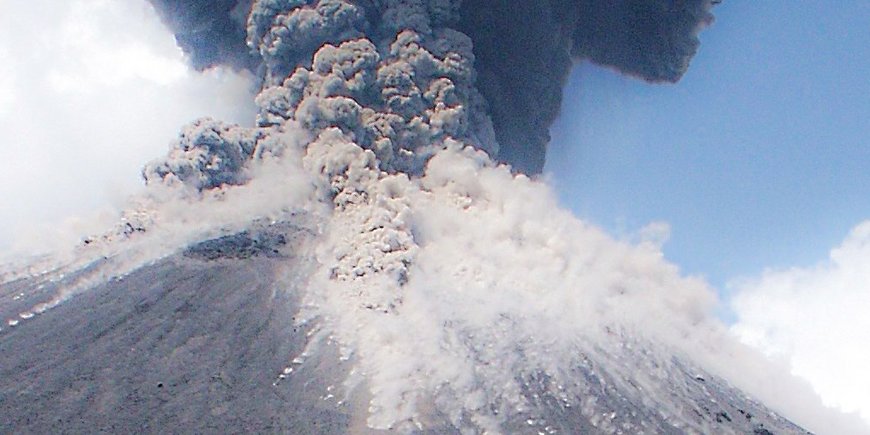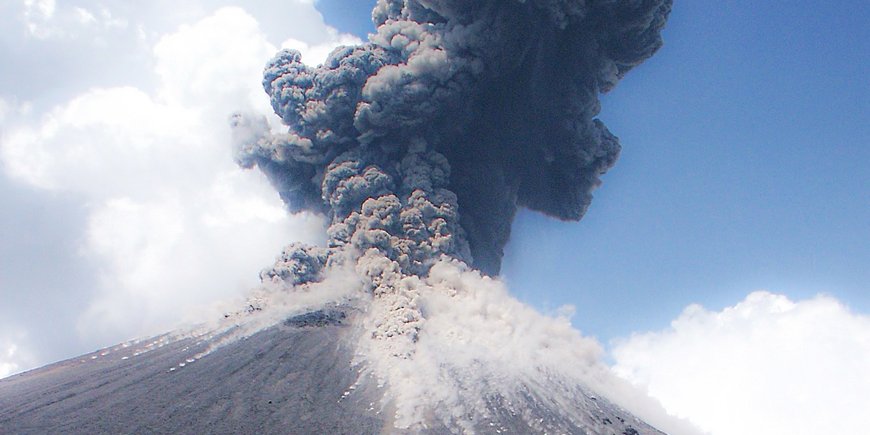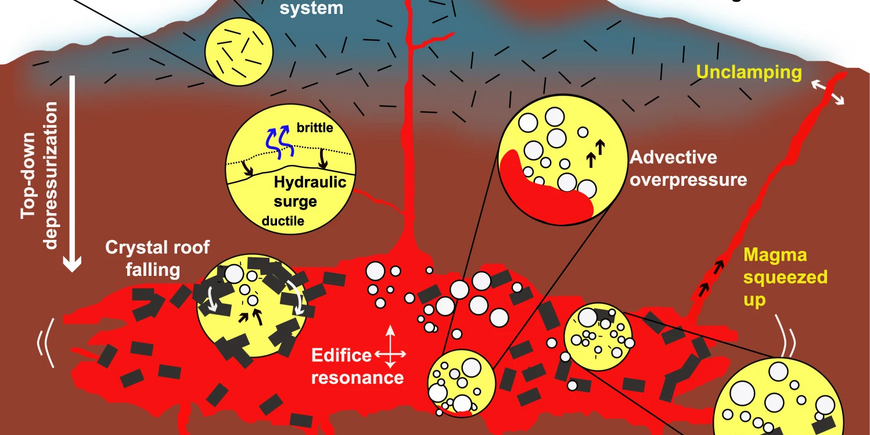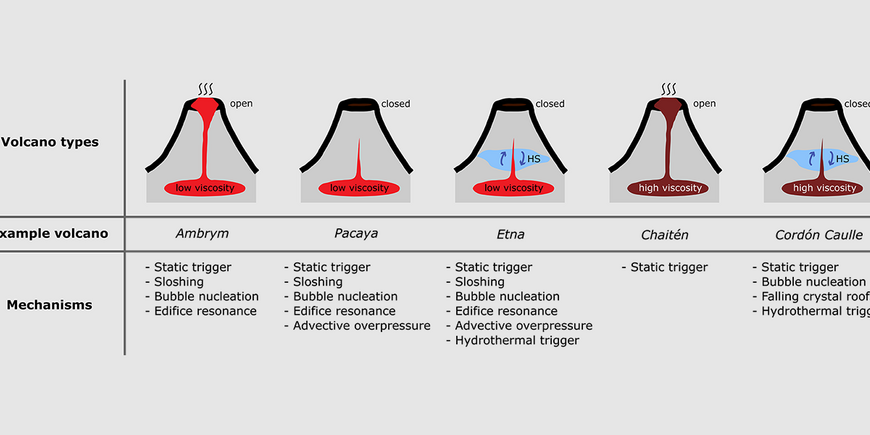Volcanic eruptions can be triggered by earthquakes. However, this is comparatively rare and only happens when the volcano is already on the brink of erupting. Researchers around Gilles Seropian from the University of Canterbury, New Zealand, with the collaboration of Thomas Walter from the German Research Centre for Geosciences (GFZ) and the University of Potsdam, have shown this using a large number of existing data and studies. The team analysed the circumstances under which such triggering is to be expected and the underlying mechanisms. They present their new classification of volcanoes in the journal Nature Communications. This also results in new approaches for monitoring volcanoes.
Earthquakes trigger a variety of reactions in volcanoes, both in those close to the epicentre and in those far away from it. For example, they can cause cracks in the rock to open or close, magma to start sloshing, or pressure conditions in gases, fluids and magma to change. How and when eruptions can actually occur as a result of earthquakes has been discussed for a long time, but is still insufficiently systematically researched.
Classification of volcanoes through broad data analysis
The interdisciplinary team around Gilles Seropian from the University of Canterbury, New Zealand, including Thomas Walter, working group leader in the Earthquake and Volcano Physics Section at the GFZ, has now compiled and analysed the current state of knowledge on this subject. They looked at data from volcanic laboratory models as well as infrared satellite monitoring and complex mathematical earthquake models. The researchers had to select the relevant data, compare them and combine the relevant results into a single model that covers the most important aspects.
In this way, they have developed a new classification of volcanoes that makes it possible to systematically relate the effects of different earthquake scenarios to volcanic activity. They divide volcanoes into five common types and consider eight different seismic scenarios, giving a total of 5 × 8 = 40 possible combinations. For each of these cases, they identify which physical mechanisms can favour a volcanic eruption. One finding: in principle, this is possible for every type of volcano.
Trigger mechanisms in earthquakes
Earthquakes are caused by sudden fractures in the Earth's crust. It is important to understand how the resulting stresses act in volcanoes in such a way that an eruption can occur. The researchers look at both static stresses, which are permanent and act predominantly in the immediate vicinity of the epicentre, and dynamic stresses, which are transient and can propagate over greater distances.
Three key parameters in volcanoes
Volcanoes are also very diverse - in terms of the structure of the subsurface and the surface, their chemical composition, the type of eruption or its precursor signals. In the course of their analysis, the researchers identified three key parameters for the reaction of volcanoes to earthquakes: One is the viscosity of the magma. It can be as fluid as oil or so viscous that it can carry an entire building. Secondly, it is important how easily gas can escape from the volcano. If gas is trapped at depth, pressure can build up and later lead to an explosion. And thirdly, it plays a decisive role whether hydrothermal systems are present. Hydrothermal systems are areas in a volcano where water is heated into steam by the magma below. The study shows that hydrothermal systems in particular react very sensitively to earthquakes. Once destabilised, they could reach the magma and then trigger an eruption.
Challenge: large temporal and spatial correlations
The time scales on which a volcano's response to an earthquake can be expected to vary greatly, as do the spatial distances: In about half of the volcanic eruptions with a triggering earthquake, the response occurred months after the earthquake. But effects can still be detected 2-5 years later. On the spatial scale, distances of up to 1000 kilometres can be found. The triggering of unrest phenomena such as increased quake activity, degassing, heat flow or subsidence was still observed at distances of 10,000 kilometres.
"This is also one of the big challenges when you want to identify correlations," says Thomas Walter. "Because not every temporal and spatial correlation between an earthquake and a volcanic eruption has a causal relationship behind it."
Gilles Seropian, lead author of the study, adds: "The variety of data used in our study is impressive, it definitely took a team effort to collect and understand them all. But that's also what makes the work particularly exciting: looking at such different parts of the science and trying to find a way to combine them into something useful."
Conclusion: new monitoring strategies for rather rare events
Overall, the analyses of past events showed that volcanic eruptions are rather rarely triggered directly by earthquakes. For this to happen, there must already be a certain amount of eruption activity. "Nevertheless, this work underlines the need to monitor volcanoes in detail after a large earthquake. After all, the quake can drive the next eruption. We were able to show in our study the underlying basic mechanisms. This provides useful information for monitoring strategies and contributes to improving volcanic hazard assessment," Walter sums up.
Original publication: Seropian, G., Kennedy, B.M., Walter, T.R., Ichihara, M. and Jolly, A.D. A review framework of how earthquakes trigger volcanic eruptions. Nat Commun 12, 1004 (2021). DOI: 10.1038/s41467-021-21166-8
Scientific contact:
Prof. Dr. Thomas Walter
Section Physics of Earthquakes and Volcanoes
Helmholtz Centre Potsdam
GFZ German Research Centre for Geosciences
Telegrafenberg
14473 Potsdam
Phone: +49 331 288-1253
Email: thomas.walter@gfz-potsdam.de
Media contact:
Dr. Uta Deffke
Public and Media Relations
Helmholtz Centre Potsdam
GFZ German Research Centre for Geosciences
Telegrafenberg
14473 Potsdam
Phone: +49 331 288-1049
Email: uta.deffke@gfz-potsdam.de











![[Translate to English:] Torsten Sachs in front of a climate station on a field](/fileadmin/_processed_/3/9/csm__TorstenSachs_bearbeitet_GS_4a1365ef84.jpeg)

![[Translate to English:] left image flood at the Ahrtal: image from above, several houses are flooded; left image:: Heidi Kreibich;](/fileadmin/_processed_/4/4/csm_Bild2_9af0130e9f.png)



![[Translate to English:] Start der Vega Rakete](/fileadmin/_processed_/6/4/csm_20231201-kachel_Vega-VV23-launch_ESA-CNES-Arianespace_706716b68c.jpeg)









![[Translate to English:] Poster exhibition at the Brandenburg Hydrogen Day at the GFZ, some participants in the foreground](/fileadmin/_processed_/6/5/csm_Erster_Brandenburgischer_Wasserstofftag_GFZ_402fcec95e.jpeg)
![[Translate to English:] Group picture of the participants](/fileadmin/_processed_/9/4/csm_20231108_CAWa-Workshop-Tashkent_Gruppenbild_99ea779d8a.jpeg)

![[Translate to English:] [Translate to English:] Hörsaal](/fileadmin/_processed_/e/6/csm_H%C3%B6rsal_e21ac645fb.jpeg)


![[Translate to English:] The Delegations in the Historic Library on the Telegrafenberg. In the back there are from left to right, the Dutch Ambassador for Germany, Ronald van Roeden, the Dutch Minister for Education, Culture and Science, Robbert Dijkgraaf and the scientific director of the GFZ, Susanne Buiter.](/fileadmin/_processed_/d/b/csm_Kachel-2_9eba4b4212.jpeg)

